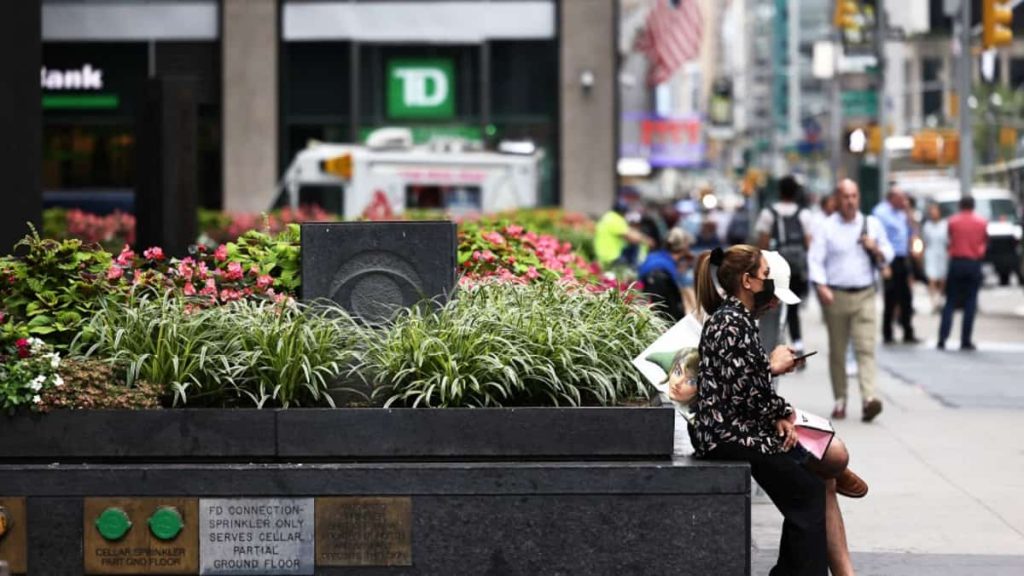Now that the initial impact of vaccination has worn off and government aid to Americans has dried up, the delta variable is casting an increasing shadow over the economic recovery in the United States.
• Read also: Fourth wave: worrying numbers in Florida
• Read also: Faced with Delta variable, Louisiana hospitals are at the end of their rope
Americans consumed much less than expected in July. Their spending is down 1.1% from June, according to figures released Tuesday by the Commerce Department.
This data is important for assessing the health of the world’s largest economy, because consumer spending accounts for three-quarters of GDP and is the engine of growth.
Economist Joel Narov summarizes: “People ate a lot in restaurants and bought appliances and electronics, but that’s it.”
Auto production, still slowing sharply due to the semiconductor shortage causing new car sales to drop, certainly weighed heavily.
But purchases of clothing, as well as construction and gardening equipment, are also declining.
On the other hand, gas stations are doing well, but this is thanks to the high prices of refueling for several months.
The economy rebounded strongly in the spring, when a vaccination campaign made it possible to reconnect with restaurants, indoor bars, air travel and hotel vacations without too much trouble.
This spending was buoyed by government checks paid in March and April, and by unemployment benefits still generous given to millions of unemployed people, and has been extended.
But it is being phased out gradually. This is already the case in half of the states, before the whole country in early September.
It is the delta variant that threatens to slow the recovery, and could take the US economy “from very fast growth to just rapid growth,” Jason Furman, a former AFP economic adviser, told AFP. President Barack Obama is a professor at Harvard.
But he said, “I think it will affect the economy, but not to the point that growth will be negative again, or jobs will be lost again.”
According to economist Ian Shepherdson of Pantheon Macroeconomics, the delta variable “began to affect (…) restaurants and air travel at the end of July.” He expects stronger consequences in August, now relying on a 3% increase in consumer spending in the third quarter, versus 6% previously expected.
A resurgence of the virus could prevent schools from reopening, slow the return to work, or even force restaurants and businesses to reduce their activity again.
Is the economy slowing down? Yes really. Is it a surprise? No. Is there anything to worry about? Not yet. The biggest problem facing the economy is the virus again. This undermines consumer confidence,” emphasizes Joel Narov.
They already believed, in the spring, near the end of the epidemic. As a result, their confidence plummeted in early August, even dropping to its lowest level in nearly a decade, according to an index measured by the University of Michigan.
Distribution giant Walmart, which unveiled better-than-expected quarterly results on Tuesday and even raised its 2021 growth forecast, indicated it was watching the rise of the delta variable.
At the end of July, the group, the number one in the sector in the United States, announced the repositioning of the mask in areas where the coronavirus is spreading, and it also forced employees at its headquarters to vaccinate before October 4.
“Interestingly, these negative numbers come at a time when the Fed plans to announce its intention to reduce its asset purchases,” notes Joel Naroff.
The US central bank can already, as of September, announce the pace at which it plans to gradually slow its support for the economy.

“Music guru. Incurable web practitioner. Thinker. Lifelong zombie junkie. Tv buff. Typical organizer. Evil beer scholar.”






More Stories
After the discovery of norovirus, these berries should not be eaten.
Mechanics Strike | WestJet Cancels Nearly 700 Flights, Affects Nearly 100,000 Passengers
Three 'basic' Airbnb listings: Owner shares how he easily skirted the rules